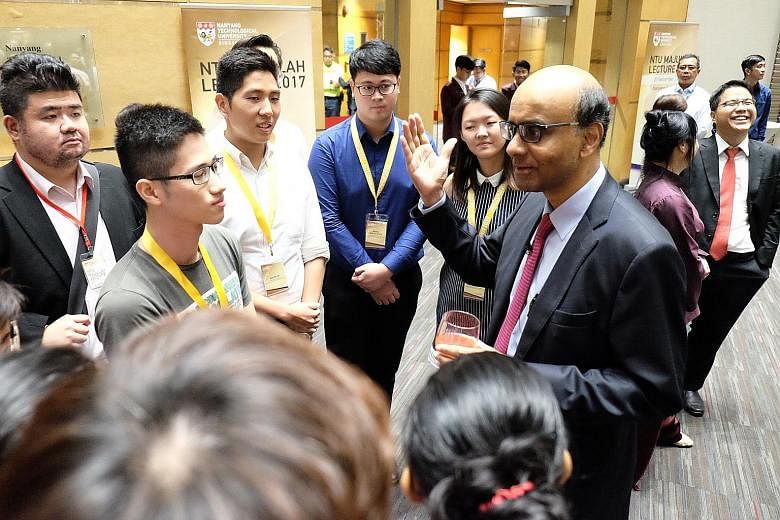The biggest mistake for Singapore's education system is to think that "if it ain't broke, don't fix it", said Deputy Prime Minister Tharman Shanmugaratnam on Wednesday evening.
In a speech addressing some 1,500 students, academics, university students and members of the public, he laid out the challenge for the education system: to develop a truly innovative society while retaining social cohesion.
"The system that we have today is different from the system we had 20 years ago, and quite different from 50 years ago. There's been constant evolution of our education system, and that's really our challenge and our opportunity for the future," he said at the first Majulah Lecture organised by Nanyang Technological University.
The annual lecture is a new initiative by the university to tackle topics about Singapore's development.
Mr Tharman, who is also Coordinating Minister for Economic and Social Policies, said the education system must keep changing and experimenting, or it might "end up on the wrong side of history".
"In education, more than in any other field, we will only know how well we are doing 20 or 30 years from now," he said.
Mr Tharman highlighted five key shifts that the education system must make to face the challenges of a tumultuous future.
The first, he said, is to do more as early as possible to give every child "a fair chance of success". "As some would put it, you've got to mitigate the 'lottery of birth'," he said.
Secondly, there needs to be "fluid and flexible pathways as children grow up", he said.
"We should avoid the extremes of either uniformity or rigid differentiation, and avoid paths with dead ends. Every path must be porous, allowing you to move from one path to another."
For instance, Singapore has moved away from streaming students to adopting subject-based banding and greater fluidity in secondary schools, he said.
The third shift is to reduce the academic load to give space to develop a culture of innovation and creative ability. "It doesn't happen if we spend a large amount of time working on high-stakes exams; you don't develop the creative part of your brain."
He noted that schools are broadening their admissions systems to allow students to develop in diverse ways.
The fourth is to get people to develop their potential throughout life, said Mr Tharman, adding that innovation requires a deep mastery of skills, which comes from experience, thinking and doing over time.
The final shift is for Singapore to deepen its multiculturalism from an early age.
"The beautiful thing about kids is that they love play, they love dance, and they love sports. We can shape these instincts if we are conscious about mixing them early in life."
In this process of deepening multiculturalism, the Singapore identity is further strengthened, said Mr Tharman.
He ended his nearly one-hour-long speech with a phrase from the National Anthem.
"When you think of our Anthem, remember 'Mari kita bersatu, dengan semangat yang baru (Let us unite, with a new spirit)'," he said.
"And that new spirit was not intended just for the day we became a new nation 52 years ago. Every so often we need that new spirit in our society, and that's how we go forward together."


